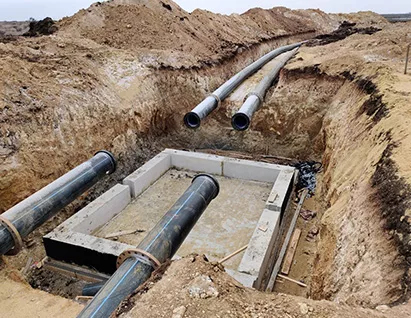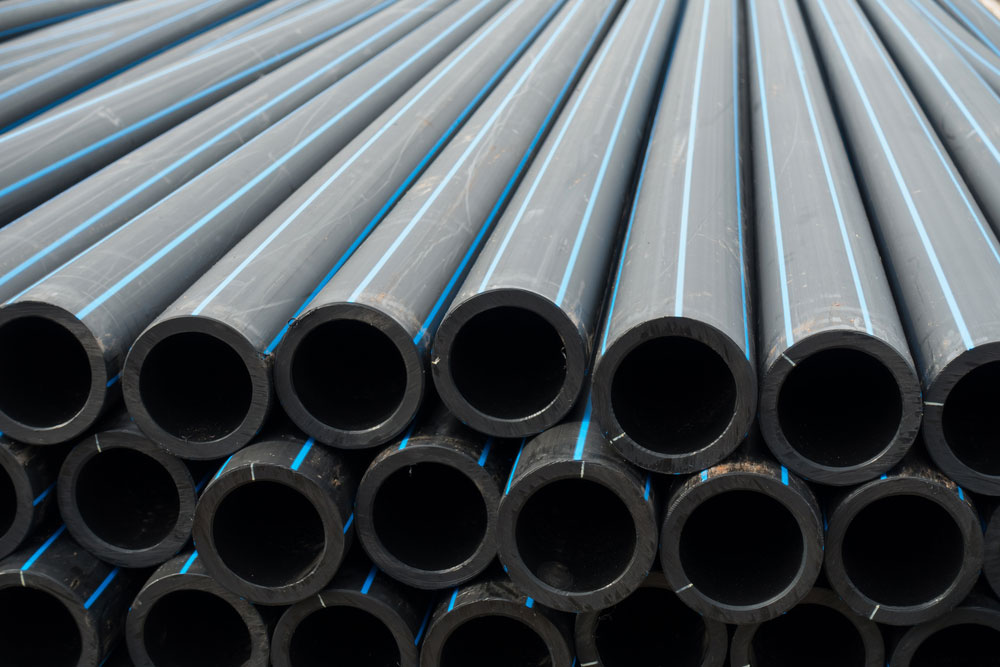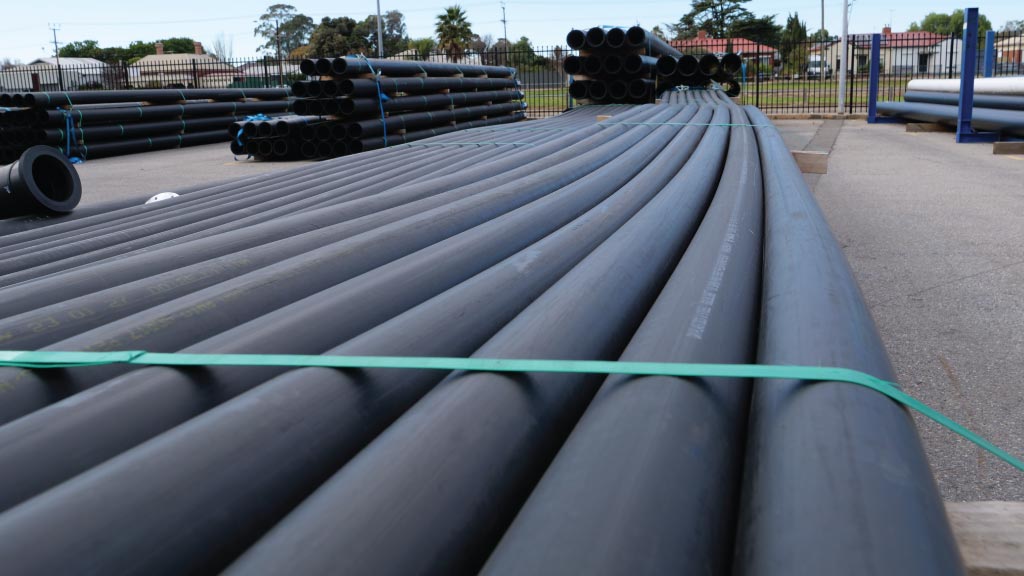Why an HDPE Pipe Supplier is key to sustainable infrastructure
Checking Out the Leading Pipeline Manufacturers: High Quality, Integrity, and Technology
The pipeline manufacturing industry stands at the junction of dependability, quality, and advancement, driven by leading firms such as Tenaris and Vallourec. These producers are not only devoted to generating high-performance materials however are additionally introducing sustainable methods that resolve modern-day environmental issues (HDPE Pipe Supplier). As we take a look at the requirements that specify quality in pipeline services, it becomes apparent that the landscape is swiftly progressing. What particular advancements are emerging, and how are these advancements forming the future of pipeline infrastructure? The answers might redefine industry criteria in manner ins which are not yet totally understood
Leading Manufacturers Review
In the domain of pipeline manufacturing, a number of principals become leaders, each adding considerably to the sector's landscape. Companies such as Tenaris, Vallourec, and JFE Steel have established themselves as frontrunners by continually providing premium products that fulfill stringent market requirements. Tenaris, renowned for its cutting-edge remedies, focuses on seamless and welded pipes, providing mainly to the oil and gas sector. Vallourec, a French international, concentrates on the manufacturing of costs tubular options, stressing sustainability and advanced innovation in its manufacturing processes.
JFE Steel, a major Japanese manufacturer, is identified for its substantial range of steel pipelines, particularly those utilized in energy and facilities projects. Their commitment to r & d has actually enabled them to generate high-performance materials that hold up against extreme environmental problems. Additionally, firms like united state Steel and National Oilwell Varco have actually expanded their market visibility by diversifying their item offerings and enhancing operational performances.
These leading producers not just dominate the marketplace but also drive technology within the industry, establishing benchmarks for high quality and integrity that other players aim to achieve. Their payments are essential for fulfilling the increasing demand for sturdy and efficient pipeline remedies worldwide.
Criteria for High Quality Analysis
Quality assessment in pipeline manufacturing hinges on two critical standards: product longevity criteria and making procedure efficiency. Making certain that products satisfy extensive sturdiness criteria is important for the durability and reliability of pipes. Furthermore, optimizing the manufacturing process can enhance productivity while keeping top quality, eventually affecting general performance and security.
Product Longevity Standards
Assuring the longevity and reliability of pipeline materials is vital for maintaining infrastructure honesty and functional performance. Product longevity criteria play a vital role in assessing the high quality of pipelines, determining the efficiency and life-span of the materials utilized in building. Manufacturers should stick to a range of strenuous standards, including those established by companies such as ASTM International and the American Petroleum Institute (API)
These requirements examine different elements, including deterioration resistance, tensile toughness, and exhaustion efficiency. For circumstances, pipes utilized in corrosive settings need products that can withstand chemical destruction, while those based on high-pressure conditions need to show exceptional tensile toughness.
Furthermore, aspects such as temperature level fluctuations and environmental problems should be considered, as these can considerably influence product behavior with time. Manufacturers usually make use of sophisticated screening approaches, including accelerated aging tests, to simulate lasting wear and warranty that products meet or surpass sector standards.
Manufacturing Process Efficiency
Manufacturers' capability to maximize making process effectiveness is essential for producing high-grade pipelines that meet rigid sector standards. Effectiveness in making straight affects expense monitoring, manufacturing timelines, and overall product stability. To achieve this, leading pipeline makers apply advanced techniques such as lean manufacturing, automation, and real-time data analytics.
Lean producing concepts are important in lessening waste and taking full advantage of source use. By simplifying processes and getting rid of redundancies, suppliers can boost performance while ensuring consistent high quality. Automation modern technologies, including robotics and computer numerical control (CNC) makers, play a pivotal function in enhancing precision and decreasing human error, thus elevating the dependability of the end product.
Additionally, making use of real-time information analytics enables manufacturers to keep an eye on production processes continuously, enabling them to identify bottlenecks and make prompt adjustments. This aggressive approach not only enhances performance but also sustains quality assurance methods by guaranteeing conformity with regulatory criteria.
Dependability in Pipeline Solutions
Reliability in pipeline services is paramount, as it straight affects the safety and efficiency of liquid transportation systems. Secret factors consist of the toughness of materials utilized, adherence to extensive testing and qualification requirements, and the incorporation of cutting-edge material solutions that enhance efficiency. Understanding these components is necessary for suppliers intending to provide dependable pipeline framework.
Significance of Durability
Accomplishing resilience in pipeline remedies is important, as it straight impacts the long-lasting performance and safety and security of facilities. Sturdy pipelines are crucial for reducing upkeep expenses and lowering the possibility of tragic failures. This dependability is specifically important in sectors such as oil and gas, water, and wastewater management, where the repercussions of pipeline failure can be severe, both financially and environmentally.
The products and making processes employed by pipeline suppliers play a significant function in figuring out the resilience of the last item. Using premium raw products, progressed modern technologies, and ingenious layout principles assures that pipelines can withstand numerous stressors, consisting of stress fluctuations, temperature variations, and destructive atmospheres.
In addition, the resilience of pipes is very closely connected to their capacity to stand up to exterior variables such as soil motion, seismic activity, and chemical direct exposures. Effective corrosion protection techniques, such as finishes and cathodic security, additionally improve the longevity of pipelines, guarding them versus deterioration over time.
Spending in sturdy pipeline options inevitably converts to raised functional effectiveness, decreased downtime, and enhanced safety and security, attesting the essential value of toughness in contemporary pipeline manufacturing.
Evaluating and Certification Criteria
In the domain of pipeline remedies, extensive testing and qualification requirements are important to guarantee the reliability and safety of framework. These requirements work as criteria for examining the performance and longevity of pipeline materials and systems, validating they satisfy particular governing and industry needs.
Evaluating processes normally include various approaches, consisting of stress screening, hydrostatic analyses, and non-destructive testing strategies. These evaluations are essential for determining potential weaknesses or problems in the materials prior to they are deployed in real-world applications. Additionally, qualification by recognized companies guarantees that makers follow established standards, which cultivates trust among stakeholders, including specialists, end-users, and designers.
Numerous prominent pipeline suppliers take part in continuous monitoring and enhancement of their screening protocols to adapt to progressing sector criteria and technical innovations. Compliance with standards such as ASTM, ASME, and ISO not only enhances product reliability yet also reduces the danger of environmental occurrences connected with pipeline failures.
Cutting-edge Product Solutions
The development of ingenious product solutions has transformed the landscape of pipeline manufacturing, boosting both performance and resilience. Advanced materials such as high-density polyethylene (HDPE), cross-linked polyethylene (PEX), and composite materials have actually become game-changers, using premium resistance to deterioration, temperature fluctuations, and stress variations. These materials not just extend the life expectancy of pipelines yet also minimize upkeep costs, making certain dependable long-lasting efficiency.
In addition, suppliers are significantly embracing smart products that include sensors for real-time surveillance. This technology permits aggressive maintenance, significantly enhancing reliability by detecting leakages or structural weak points before they rise into crucial failings. The combination of nanotechnology has actually likewise caused the advancement of coatings that boost the sturdiness of pipes against abrasion and chemical direct exposure.
Sustainability is one more vital emphasis, with suppliers checking out bio-based compounds and recyclable products that reduce ecological impact. As governing standards remain to evolve, the focus on cutting-edge material remedies ends up being extremely important in meeting strict safety and security and environmental needs. Ultimately, these improvements not just enhance the reliability of pipeline systems yet also add to the total efficiency and sustainability of energy transportation frameworks.
Innovations in Pipeline Innovation
Technologies in pipeline technology are transforming the sector by improving efficiency, safety, and environmental sustainability. Recent innovations concentrate on smart pipeline systems that make use of sensing units and IoT technology to monitor problems in real time, making it possible for aggressive upkeep and decreasing the threat of failings. These systems can detect leakages, stress modifications, and other abnormalities, enabling rapid action and minimizing ecological effect.
Furthermore, the advancement of sophisticated materials, such as corrosion-resistant and composite alloys, substantially expands the life-span and integrity of pipelines. Pipeline Manufacturer (American Plastics LLC HDPE Pipeline Manufacturer). These products minimize maintenance prices and boost efficiency in extreme atmospheres, making them suitable for gas, water, and oil transport
Additionally, automation and robotics are playing an essential duty in pipeline building and evaluation. Drones and robotic devices help with studies and assessments of hard-to-reach locations, making sure extensive evaluations without endangering safety and security.
Additionally, ingenious styles, such as modular pipeline systems, enable for greater flexibility in installment and alteration, dealing with the dynamic demands of the power industry. Together, these technical developments not only improve operational efficiency but additionally add to a more resilient and sustainable pipeline framework, paving the way for a greener future.
Situation Studies of Success
Throughout different fields, effective applications of innovative pipeline modern technologies show considerable renovations in operational effectiveness and safety and security. One remarkable instance is the implementation of clever pipeline surveillance systems in the oil and gas market, where real-time information analytics have actually reduced leak discovery times by over 50%. This not just decreases environmental dangers yet also enhances the general stability of pipeline framework.

Additionally, a significant manufacturer applied robot evaluation technologies in its pipeline upkeep procedures, leading to a 40% enhancement in inspection performance. This technique has streamlined upkeep routines and substantially reduced downtime.
These study highlight exactly how top pipeline suppliers are leveraging innovative modern technologies to promote reliability and functional excellence, inevitably setting brand-new requirements for the industry. As these successes remain to unfold, they lead the way for further innovations in pipeline manufacturing and management.

Ecological Sustainability Practices
Frequently, pipeline makers are focusing on ecological sustainability practices to alleviate their environmental impact and improve the durability of their products. This commitment is mirrored in different campaigns targeted at minimizing waste, preserving energy, and utilizing sustainable materials throughout the manufacturing process.

Several manufacturers are adopting sophisticated innovations that lessen discharges and power usage. For circumstances, the integration of automated systems and energy-efficient machinery helps streamline manufacturing while lowering dependence on nonrenewable fuel sources. Additionally, firms are significantly transforming to eco-friendly products, such as recycled steels and bioplastics, which not only decrease the environmental influence yet additionally advertise a circular economic situation.
Pipeline suppliers are carrying out extensive lifecycle evaluations to evaluate the ecological effects of their items from inception to disposal. This approach allows them to recognize chances for improvement and foster responsible sourcing and waste monitoring practices.
Cooperation with environmental organizations better improves these initiatives, as manufacturers seek to straighten their operations with global sustainability objectives. Eventually, these ecological sustainability practices not only add to a much healthier world yet likewise placement manufacturers as accountable leaders in the sector, attracting environmentally conscious stakeholders and consumers alike.
Future Trends in Pipeline Manufacturing
As the demand for a lot more effective and lasting framework grows, pipeline manufacturing is poised for substantial developments that will certainly reshape the sector. Trick patterns anticipated in the coming years consist of the combination of sophisticated materials, such as composite and corrosion-resistant alloys, which improve toughness while minimizing ecological impact. Manufacturers are likewise anticipated to adopt ingenious manufacturing techniques, like additive manufacturing and automation, to enhance procedures, reduce waste, and lower prices.
The rise of smart pipeline technologies, incorporating sensors and IoT gadgets, will enable real-time monitoring and predictive upkeep, thereby boosting safety and operational efficiency. This electronic makeover will certainly not just enhance source management but also help with compliance with stringent ecological laws.
Sustainability will certainly stay a main emphasis, driving makers to buy environment-friendly methods, including energy-efficient production approaches and reusing efforts. As the global emphasis on environment modification heightens, pipeline producers will certainly require to adjust by establishing services that meet both financial and environmental demands.
Regularly Asked Concerns

What Industries Largely Use Pipeline Products From These Manufacturers?
Pipeline items are mainly utilized in sectors such as oil and wastewater, gas and water management, chemical building, mining, and handling. These fields depend on effective, sturdy, and safe transportation of fluids and products.
How Do Manufacturers Guarantee Compliance With International Pipeline Specifications?
Manufacturers assure conformity with international pipeline standards by applying rigorous quality assurance procedures, performing normal assessments, adhering to established governing frameworks, and buying staff member training to promote awareness and understanding of security and high quality needs.
What Is the Typical Life Expectancy of Pipelines From Leading Manufacturers?
The ordinary life-span of pipes from leading producers typically ranges from 30 to 100 years, depending upon product, environmental problems, and upkeep techniques. American Plastics LLC HDPE Pipeline Manufacturer. Normal assessments and adherence to market requirements significantly influence longevity and performance
Are There Certifications Details to Pipeline Production High Quality?
Yes, various certifications exist for pipeline making top quality, including ISO 9001 for quality monitoring systems and API requirements details to pipes. These qualifications ensure adherence to rigorous safety and security, efficiency, and environmental criteria within the market.
How Do Manufacturers Deal With Pipeline Maintenance and Services?
Manufacturers normally execute an aggressive maintenance strategy that consists of regular examinations, keeping an eye on systems for very American Plastics LLC HDPE Pipe Solutions early detection of concerns, and a structured fixing procedure. This approach assurances pipeline integrity, lessens downtime, and enhances general functional efficiency.
Quality assessment in pipeline manufacturing pivots on 2 vital criteria: material durability requirements and making process performance - HDPE Pipe Supplier. Product longevity requirements play a vital role in examining the top quality of pipelines, dictating the efficiency and life expectancy of the materials utilized in building and construction. The materials and manufacturing procedures used by pipeline manufacturers play a considerable duty in determining the resilience of the last item. The average life expectancy of pipes from leading suppliers typically ranges from 30 to 100 years, depending on material, ecological problems, and upkeep techniques. Yes, various certifications exist for pipeline producing high quality, consisting of ISO 9001 for top quality monitoring systems and API criteria specific to pipelines